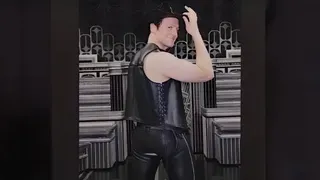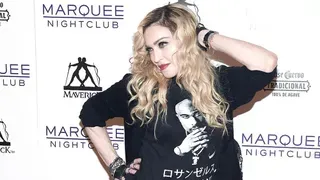September 19, 2008
Carol Channing: Back where she belongs!
Michael Wood READ TIME: 4 MIN.
Oh, that voice! In a recent phone interview, it was abundantly clear that Carol Channing's gift of sounding both sophisticated and childlike is undimmed by time. Also intact is her infectious but never cloying high spirits. Only the most devout grouch could resist her elan, and to honor this singular 87-year-old show-business veteran, San Francisco's Museum of Performance & Design will open Hello, Carol! A Celebration of Carol Channing on Sept. 26, and exhibit through March 14. All things Carol will be on display, including posters, programs, drawings, photos, film and audio clips, her show-business awards, and that eye-popping red dress she wore for her immortal Harmonia Gardens entrance in Hello, Dolly!
On Sept. 25, she'll appear at the Herbst Theatre with Carole Cook and the California Pops Orchestra in Carol Channing & Friends. The performance will benefit statewide public schools arts-in-education programs, a cause she and her husband, land developer Harry Kullijian, have been championing for years. In fact, Channing is every bit as interested in talking about arts in education as she is in her career. "It's a physical thing," she said of children and the arts. "It expands your brain. It makes you better in math and science. I wasn't the brightest student in the world, but I skipped a grade or two. Why? Because I was dancing up a storm, going to the Curran Theater, seeing the greatest artists in the world. My brain was being fertilized."
Channing is someone who seems like an open book, but isn't. Her resume is full of surprises. Born in Seattle in 1921, the only child of a journalist, she embraced her parents' Christian Science faith while discovering her knack for entertaining. During a break from studies at Vermont's Bennington College in 1941, she made her first New York appearance in the antifascist opera No for an Answer. "I got a one-sentence review from [music critic] Virgil Thompson: 'You'll surely hear more about satirical singer Carol Channing.' Well, I carried that review on my person for the next four years," she said. In Lend an Ear, one of her early revues, she stopped the show with her 1920s spoof The Gladiola Girl, but not everyone was smitten. "For Chrissakes, she can't sing and she looks crazy," said musical director Milton Rosenstock. "Those big eyes, that funny voice. She's weird." She trudged onward undeterred, understudying Eve Arden and Rosalind Russell, playing the Borscht Belt, and touring with Danny Thomas and Imogene Coca. "Reviews kept saying I was 'the most promising' this or that," she said. "That was all nice, but when was I going to get beyond promising?"
That would happen in 1949, with Gentlemen Prefer Blondes. Her turn as gold-digger Lorelei Lee became one of her two signature roles. And it was Channing, not Marilyn Monroe, who first made "Diamonds are a Girl's Best Friend" her own. She preempted accusations of typecasting by taking on Shaw, playing Epifania in The Millionairess and Eliza in Pygmalion. Tailor-made musicals The Vamp and Show Girl came and went, and she was Tony-nominated for both.
When the subject of her film debut in The First Traveling Saleslady is raised, Channing is a good sport. "I can't lose that movie," she said with a laugh. Yes, it's true, she and Clint Eastwood were romantically paired. "We were both new to the movies and didn't know what we were doing, so we spent every lunch hour practicing our clinch," she said. "But, oh, it was the most terrible movie ever made! It was so bad that [star] Ginger Rogers' mother would step in and tell us what to say. Ginger Rogers' mother!"
Dolly days
In 1964, Hello, Dolly! opened at the St. James Theatre, and it became not only the biggest smash of her career, but for a time the longest-running musical in Broadway history. The pushy, manipulative, but slyly romantic matchmaker Dolly Levi fit Channing like a pair of tailored velvet gloves, and she won a Tony for the part. After Broadway, she took Dolly on umpteen tours and revivals, logging in an estimated 5,000 performances. She mentioned one memorable stopover by way of expressing her affection for the gay community and drag queens everywhere. "When I played San Francisco in the first tour of Hello, Dolly! back in the late 60s, the Royal Court System made me their queen," she said. "Judith Anderson never gave such a performance. Some of the youngers don't know that I'm their queen. And that's for life! They gave me a golden throne, paid serious homage, and said I was the biggest little queen of them all!" Later she sang with the Gay Men's Chorus and appeared at Gay Pride Day in Hollywood. "We all sing in the same key," she said with audible warmth. "Now you know how grateful I am. They've been very kind to me."
Her lively performance as Muzzy Van "Raspberries" Hossmere in Thoroughly Modern Millie was an unofficial audition for the film version of Dolly!, but it went to Barbra Streisand, who had the name and musical chops all right, but was absurdly underage for the role. Channing was devastated. "On the day they started rehearsal, I called [director] Gene Kelly and said, 'Please let me do Hello, Dolly!,'" she said. "He said he had nothing to do with it. I had dinner with him that night. He felt sorry for me."
No need for anyone to feel sorry for her now. In testimony to her unwavering faith in the theater and Christian Science, Channing goes on even when she's sick. She says she either feels better or is cured as a result. And she is strengthened, both for performing and for arts in education, by an epiphany she had before going on stage for the first time in the fourth grade. "I was terrified. My knees were knocking. We were all shutting down because of being scolded and corrected," she recalled of her young classmates in a rigidly disciplined classroom. "Then I realized we're all alike. We laugh at the same things. We cry at the same things. And I felt the audience coming toward me; they magnetized me. At that moment, I wanted to lift their lives. And that's what I've wanted to do ever since. To lift people's lives."
Michael Wood is a contributor and Editorial Assistant for EDGE Publications.







